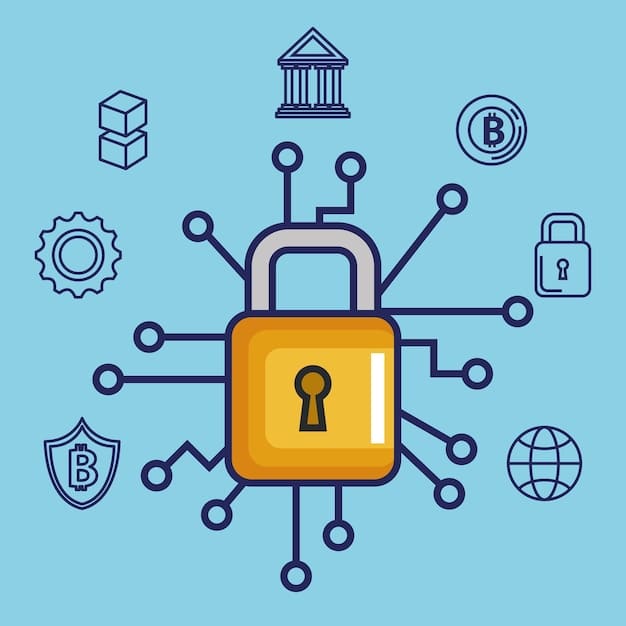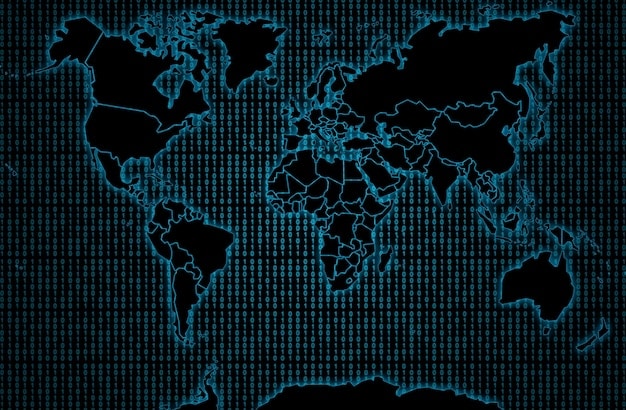What is a VPN and Do You Really Need One? A Comprehensive Analysis for 2025

A Virtual Private Network (VPN) encrypts your internet connection and masks your IP address, enhancing online privacy and security. While not universally essential, a VPN offers significant benefits, especially if you regularly use public Wi-Fi, wish to bypass geo-restrictions, or prioritize anonymity in an increasingly surveilled digital landscape, making it a critical tool for many users in 2025.
In an era where digital footprints are meticulously tracked and online threats loom large, understanding the tools available to safeguard your presence is more crucial than ever. This comprehensive analysis delves into the fundamental question: What is a VPN and Do You Really Need One? A Comprehensive Analysis for 2025, exploring its core functionalities, evolving relevance, and whether it merits a place in your digital arsenal today.
Understanding the Core: What Exactly is a VPN?
A Virtual Private Network (VPN) creates a secure, encrypted connection over a less secure network, such as the internet. Think of it as a private, impenetrable tunnel through the public internet. This process safeguards your online activities from prying eyes, making it significantly harder for third parties—be it internet service providers (ISPs), governments, or cybercriminals—to monitor your browsing, streaming, or downloading habits.
At its heart, a VPN works by routing your device’s internet connection through a private server operated by the VPN provider, rather than directly connecting to your ISP. This server acts as an intermediary, encrypting your data before it leaves your device and decrypting it once it reaches its destination. Crucially, your internet traffic appears to originate from the VPN server’s IP address, effectively masking your own IP address and location.
The Mechanics of a VPN Connection
The journey of your data through a VPN involves several key steps that contribute to its enhanced security and privacy. Understanding these mechanics provides a clearer picture of why VPNs are so effective.
- Encryption: When you connect to a VPN, your data is immediately encrypted. This scrambling process ensures that even if intercepted, your information remains unreadable and unintelligible to unauthorized parties.
- IP Masking: Your true IP address is hidden, replaced by the IP address of the VPN server. This makes it challenging to trace your online activities back to your device or physical location, significantly boosting anonymity.
- Tunneling Protocols: VPNs utilize various tunneling protocols (like OpenVPN, IKEv2, WireGuard) to create and maintain the secure connection. These protocols dictate how the data travels through the encrypted tunnel, impacting speed and security levels.
This intricate process ensures that your online communications are not only private but also protected from various forms of cyber interception. The ability to choose server locations worldwide also opens up possibilities for bypassing geo-restrictions, a feature that has gained considerable popularity among users seeking access to region-locked content.
In essence, a VPN provides a dual layer of protection: it encrypts your data to prevent unauthorized access and masks your identity by assigning you a temporary IP address. This foundational understanding is crucial for appreciating the broader implications of VPN use in 2025.
Evolving Digital Threats: Why VPNs are More Relevant in 2025
The digital landscape of 2025 is characterized by a significant increase in data harvesting, targeted advertising, and sophisticated cyber threats. As our lives become inextricably linked with the internet, the need for robust online privacy and security measures has never been more pressing. VPNs address several critical concerns that have escalated in recent years.
One primary concern is the ubiquitous nature of public Wi-Fi networks. While convenient, these networks are often unsecured, making them fertile ground for cybercriminals to intercept data. From coffee shops to airports, using public Wi-Fi without a VPN leaves your sensitive information—passwords, financial details, personal messages—vulnerable to interception. A VPN encrypts your traffic on these networks, creating a secure conduit that foils potential data snoopers.
The Escalation of Data Surveillance and Geo-Restrictions
Beyond individual threats, there’s a broader systemic shift towards increased data surveillance, both by corporations and governments. ISPs in many regions are legally allowed to collect and sell your browsing data. This information can be used for targeted advertising, but also potentially accessed by government agencies without your explicit consent. A VPN acts as a shield, preventing your ISP from seeing your actual online activities.
- Corporate Data Harvesting: Businesses track your online behavior to build detailed profiles for advertising, sometimes sharing this data with third parties without full transparency. VPNs obscure your browsing habits from these trackers.
- Government Surveillance: In an interdependent world, national security concerns often lead to broader surveillance programs. While VPNs do not offer complete anonymity from highly determined state actors, they significantly raise the bar for tracking individual activities.
- Geo-Blocking Practices: Content providers and online services frequently restrict access based on geographical location. This means that a show available in the UK might not be accessible in the US. By allowing users to route their connection through servers in different countries, VPNs circumvent these restrictions, offering a global passport to internet content.
The shift towards a more interconnected and data-driven society means that privacy is no longer a luxury but a necessity. The evolving regulatory landscape, with varying data privacy laws across countries, further complicates the picture. For consumers in the US, where privacy regulations might not be as stringent as in some other regions, a VPN becomes an active choice to regain control over their digital footprint in 2025.
These escalating threats and evolving digital norms underscore the heightened relevance of VPNs, transforming them from a niche tool for tech enthusiasts into a mainstream solution for everyday internet users concerned about their privacy and access.
Key Benefits: How a VPN Enhances Your Online Experience
The advantages of using a VPN extend beyond mere security, touching upon aspects of online freedom, convenience, and performance optimize. By understanding these multifaceted benefits, users can better assess the value a VPN brings to their specific digital habits.
One of the most immediate and tangible benefits is enhanced privacy. A VPN encrypts your data and hides your IP address, allowing you to browse the internet with a greater degree of anonymity. This is particularly valuable for individuals who wish to keep their online activities private from their internet service provider, advertisers, and other third parties who might otherwise collect and monetize their data.
Beyond Privacy: Unlocking New Possibilities
While privacy remains a cornerstone, VPNs offer several other compelling benefits that contribute to a richer online experience:
- Bypassing Geo-Restrictions: As mentioned, VPNs are powerful tools for accessing geo-restricted content. Whether it’s streaming services, news websites, or online games, a VPN allows you to virtually relocate, unlocking a world of content previously inaccessible.
- Secure Public Wi-Fi Usage: Public Wi-Fi networks are notorious for their security vulnerabilities. A VPN creates an encrypted tunnel, protecting your data from sniffers and hackers on unsecured networks, ensuring that your sensitive information remains private.
- Avoiding ISP Throttling: Some ISPs intentionally slow down internet speeds for certain types of traffic, such as streaming or gaming, a practice known as throttling. Since a VPN encrypts your traffic, your ISP cannot see what you’re doing online, making it difficult for them to implement discriminatory throttling.
- Enhanced Security for Online Transactions: When conducting online banking or shopping, the added layer of encryption provided by a VPN can significantly reduce the risk of your financial details being intercepted.
Another often overlooked benefit is the potential for bypassing censorship. In countries with strict internet censorship, VPNs can enable access to blocked websites and social media platforms, fostering free communication and access to information. This aspect of VPN utility underscores its role as a tool for digital freedom in restricted environments.
Furthermore, savvy online shoppers can sometimes leverage VPNs to find better deals. Prices for flights, hotels, and online subscriptions can vary by region. By connecting to servers in different countries, users might uncover more favorable pricing. These diverse benefits illustrate that a VPN is far more than just a security tool; it’s an enabler of a more private, open, and optimized online journey.

Do You Really Need a VPN? Assessing Your Personal Use Case in 2025
The question of whether you “really need” a VPN isn’t a simple yes or no; it depends heavily on your individual internet usage habits, your risk tolerance, and your privacy concerns. While VPNs offer universal benefits, their necessity varies from person to person. As we move further into 2025, a critical self-assessment is key.
Consider your daily online routine. Do you frequently connect to public Wi-Fi networks in coffee shops, airports, or hotels? If so, a VPN becomes a near-essential tool. These networks are often unsecured and are prime targets for cyber criminals looking to intercept data. Without a VPN, your emails, banking details, and other sensitive information could be vulnerable to capture.
Identifying Your Digital Habits and Needs
Beyond public Wi-Fi, several other scenarios point towards a strong need for a VPN:
- Regular Travel: If you travel internationally, a VPN can be invaluable. It not only secures your connection on foreign networks but also allows you to access your home country’s content and services, bypassing geo-restrictions.
- Streaming & Content Access: For those who enjoy streaming content from different regions or want to access specific features only available in certain countries, a VPN is almost a prerequisite.
- Online Gaming: Gamers can benefit from VPNs by reducing ping, bypassing geo-restrictions on games, or protecting against DDoS attacks, which often target competitive players.
- Privacy Advocates: If you are deeply concerned about your online privacy and wish to prevent your ISP from logging your browsing habits, or mitigate corporate data harvesting, a VPN is a powerful proactive measure.
- Remote Work/Study: Many companies and educational institutions require VPN access to securely connect to their internal networks, especially when employees or students are working remotely.
On the other hand, if your internet usage is minimal, confined to a secure home network, and you have little concern for accessing geo-restricted content or avoiding ISP tracking, the immediate benefits might seem less pronounced. However, even in such cases, the foundational security layer a VPN provides against emerging threats—or even against your own ISP’s data practices—should not be entirely dismissed.
Ultimately, the decision balances convenience, cost, and the perceived level of digital risk. For an increasing number of users in 2025, where data privacy breaches are common and online censorship is a growing concern, a VPN is transitioning from a niche security tool to a widely applicable piece of everyday digital hygiene, much like antivirus software.
Choosing the Right VPN: What to Look for in 2025
With an abundance of VPN providers on the market, selecting the right one can be daunting. In 2025, the criteria for a high-quality VPN have become more stringent, emphasizing factors like robust security, transparent policies, and reliable performance. A hasty choice can lead to suboptimal protection or even compromise your privacy.
The first and foremost consideration should be the provider’s privacy policy. A “no-logs” policy is paramount, meaning the VPN provider does not collect or store any data about your online activities. Independent audits verifying these claims are a significant green flag. Without a strict no-logs policy, the very purpose of privacy-enhancing VPN usage is undermined, as your data could still be accessible to the VPN provider themselves.
Key Features and Considerations for Your VPN Choice
Beyond logging policies, several technical and practical aspects contribute to a VPN’s effectiveness and user satisfaction:
- Strong Encryption & Protocols: Look for VPNs that offer industry-standard AES-256 encryption and support modern, secure protocols like OpenVPN, WireGuard, or IKEv2. Avoid providers still relying on outdated or insecure protocols.
- Server Network: A large and geographically diverse server network offers more options for bypassing geo-restrictions and finding faster connections. More servers typically mean less congestion and better performance.
- Speed & Performance: While a VPN inherently adds some overhead, a good VPN should minimize speed degradation. Test potential VPNs for speed and reliability, especially if you plan on streaming or gaming.
- Kill Switch: An essential security feature, a kill switch automatically disconnects your device from the internet if the VPN connection drops unexpectedly, preventing your real IP address from being exposed.
- Simultaneous Connections: Check how many devices you can connect simultaneously with a single subscription. Most reputable providers allow multiple connections, covering your laptop, phone, and tablet.
Customer support is another often-overlooked factor. Reliable 24/7 customer support can be invaluable when troubleshooting connection issues or understanding advanced features. Pricing models also vary; while free VPNs might seem appealing, they often come with significant limitations, such as data caps, slower speeds, intrusive ads, or even by selling your data. Paid VPNs, particularly those with a strong track record and clear privacy policies, generally offer a superior and more secure experience.

Ultimately, investing in a reputable VPN means investing in your digital well-being. Thorough research, reading independent reviews, and taking advantage of free trials or money-back guarantees are prudent steps to ensure you select a VPN provider that truly meets your needs in 2025’s dynamic online environment.
Future Outlook: VPNs as an Indispensable Digital Tool
As we project forward into the latter half of 2025 and beyond, the role of VPNs is likely to evolve from a specialized cybersecurity tool to a more ubiquitous and indispensable component of our digital lives. The trends indicate a future where digital privacy and security are not just desired but demanded by the average internet user, propelled by increasing awareness and regulatory shifts.
The rising tide of data breaches, increasingly sophisticated cyber threats, and the continuous expansion of digital surveillance—both corporate and governmental—will solidify the VPN’s position. Governments worldwide are debating and implementing new data privacy laws, but the patchwork nature of these regulations means individuals often bear the responsibility for their own protection. A VPN offers a consistent layer of defense regardless of geographical location or local legislation.
The Expanding Ecosystem of Digital Privacy Tools
VPNs will likely integrate more seamlessly into broader digital ecosystems, becoming part of comprehensive privacy suites that include features like ad-blockers, anti-tracking tools, and secure cloud storage. This integration will make privacy solutions more accessible and user-friendly for a wider audience.
We may also see enhanced focus on:
- Quantum-Resistant Encryption: Anticipating the advancements in quantum computing, VPN providers will likely innovate and adopt quantum-resistant encryption algorithms to secure data against future decryption methods.
- Decentralized VPNs (dVPNs): The emergence of decentralized VPNs, leveraging blockchain technology, could offer even greater anonymity and resistance to censorship by distributing VPN servers across a decentralized network, making it harder for any single entity to control or shut down the network.
- AI-Powered Threat Detection: VPN services might integrate AI to proactively detect and block emerging threats, phishing attempts, and malicious websites in real-time, offering a more dynamic layer of security.
The increasing prevalence of remote work and the reliance on cloud-based services further underscore the practical utility of VPNs. Businesses and individuals alike will continue to leverage VPNs to ensure secure access to sensitive data and internal networks from any location, minimizing the attack surface for cyber threats.
In essence, the future of VPNs points towards them becoming as fundamental as antivirus software or firewalls for digital hygiene. They will serve as a foundational layer of protection and freedom, enabling individuals to navigate the complex and often precarious digital world of 2025 with greater confidence and control over their personal information and online experiences.
| Key Point | Brief Description |
|---|---|
| 🔒 Data Encryption | Secures your internet traffic, making it unreadable to third parties like ISPs or hackers. |
| 🌐 IP Masking | Hides your real IP address, enhancing anonymity and preventing location tracking. |
| 🌍 Geo-Bypass | Access content and services restricted by geographical location, expanding your online access. |
| 🛡️ Public Wi-Fi Security | Protects your data from snooping on unsecured public Wi-Fi networks. |
Frequently Asked Questions About VPNs (FAQ)
Yes, using a VPN is legal in most countries, including the US. However, it’s illegal in some nations with strict internet censorship, like China or Russia. Even where legal, using a VPN for illegal activities remains illegal. Always comply with local laws and the terms of service of any platforms you use.
A VPN can sometimes slightly reduce internet speed due to encryption and routing traffic through an extra server. The extent depends on the VPN provider’s quality, server proximity, and your original internet speed. Premium VPNs usually minimize this impact, offering optimized servers for fast connections.
Many free VPNs come with significant downsides, including data caps, slower speeds, intrusive ads, and potential privacy risks or data logging. Some free services may even sell user data to third parties. For robust security and privacy, investing in a reputable paid VPN is generally recommended.
While a VPN significantly enhances your privacy and security by encrypting data and masking your IP, it’s not a silver bullet. It doesn’t protect against malware, phishing attacks, or viruses. A VPN should be part of a broader cybersecurity strategy, including antivirus software and careful online behavior.
Consider factors like a strict no-logs policy, strong encryption (AES-256), a large server network, good speeds, a kill switch feature, and reliable customer support. Evaluate your specific needs—like streaming, gaming, or general browsing—and read independent reviews. Many reputable VPNs offer free trials or money-back guarantees.
Conclusion
In the dynamic digital landscape of 2025, the critical question of whether you need a VPN transcends a simple choice; it’s an informed decision based on your personal online habits and a growing awareness of pervasive digital threats. From safeguarding your privacy on public Wi-Fi to bypassing geographical content restrictions and enhancing overall digital anonymity, a VPN serves as a crucial tool for a more secure and open internet experience. While not every online activity demands one, the escalating risks of data surveillance and cybercrime increasingly position a reliable VPN as an indispensable component of comprehensive digital hygiene for a significant portion of internet users.





